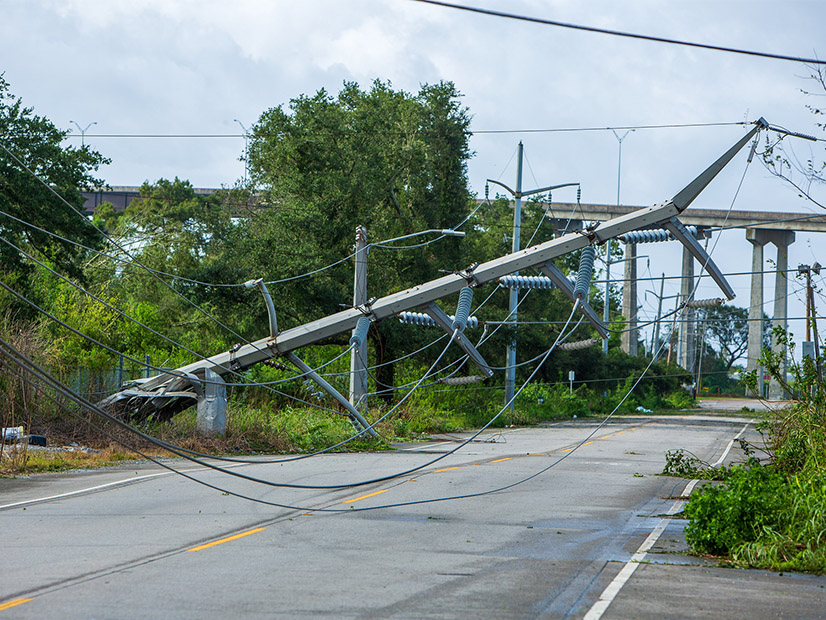Entergy (NYSE:ETR) said Monday that it’s too early to make restoration estimates for the nearly one million customers without power after Hurricane Ida’s trek through Louisiana and Mississippi.
The eight transmission lines supplying the city of New Orleans remained knocked out of service Monday. In addition to the complete Orleans Parish blackout, the Jefferson, St. Bernard and Plaquemines parishes are all without power. Portions of the St. Charles and Terrebonne parishes are also dark.
On Sunday night the storm toppled an Entergy transmission tower on the banks of the Mississippi River near the Nine Mile Point power plant in Avondale, La., 15 miles west of New Orleans. (See Hurricane Ida Thrashes Louisiana; Storm Darkens New Orleans.)
Entergy said the same transmission tower was able to withstand Hurricane Katrina’s abuse exactly 16 years earlier. Hurricane Ida was smaller in size but stronger when compared to Katrina.
The utility said Ida retained hurricane status almost to the Mississippi state line. It reported nearly 900,000 power outages in Louisiana and about 45,000 outages in Mississippi. Entergy said it expected the Mississippi totals to increase as the storm crawled inland.
Entergy said Monday morning more than 2,000 miles of transmission lines and 216 substations were out of service throughout its service territory.
The restoration effort is certain to be lengthy and messy, with crews slow in being able to safely assess damage. Entergy said road closures and flooding make inspecting the destruction difficult.
Entergy New Orleans CEO Deanna Rodriguez told local news outlets on Monday that she had no restoration timeline to offer. Jefferson Parish Emergency Management Director Joe Valiente predicted it would take at least six weeks for customers in his parish to get power back. He called the damage “incredible.”
“With extensive damage, we have a lot of rebuilding ahead of us. We’ll be better prepared to give restoration estimates once assessments are done,” Entergy New Orleans announced in a Facebook post.
In a separate press release, the company added it would be “premature to speculate at this time when power will be restored given the extent of the damage.” It said it would learn more as the weather clears and that its crews were using infrared cameras, drones and satellites to survey damage in some inaccessible areas.
Even with the technology, Entergy said “lack of access in areas like waterways and marshes could delay” damage assessment.
The utility said it continued to provide some backup power service to the New Orleans Sewerage and Water Board to bail out floodwater and pump drinking water into the city.
The Sewerage and Water Board’s pumps are normally partially powered by Entergy. MISO recently approved Entergy’s expedited request to construct a new 230-kV substation to take on all load for stormwater drainage by 2023 and supplant the board’s own aging turbines. (See Entergy Expedites MISO Tx Project, Cancels 4 Others.)
By Monday morning, New Orleans City Council members were reportedly questioning whether Entergy’s plan deserves further scrutiny in light of the massive outages.
MISO spokesman Brandon Morris said the RTO is coordinating with Entergy on restoration efforts but echoed that it will probably take “days to determine the full extent of the damage to their transmission lines and electricity generators.”
“Our member companies are working hard to assess the storm damage under difficult circumstances,” Daryl Brown, executive director of MISO South, said in an emailed statement. “Once those assessments are completed, our control room team will be working closely with them to prioritize restoration efforts. This process will take time and the safety of personnel is paramount.”
MISO said Ida wrought the most significant damage in Southeast Louisiana. MISO South remains under a severe weather alert and conservative operations until 11:59 p.m. Tuesday. Morris said those declarations could be extended or new warnings issued “to safely support member utilities’ damage assessment activities.”
The dead buses around New Orleans likely won’t be priced at MISO’s $3,500/MWh value of lost load (VoLL) because the grid failure was brought on by a transmission emergency, not an insufficient capacity emergency.
MISO is in the middle of recasting its VoLL to a higher amount and getting a better handle on when it should be used in pricing. The RTO originally said force majeure events that lead to dead buses should not be priced using VoLL. (See MISO to Outline New Pricing Plan for Hurricanes.) Now MISO says VoLL is appropriate to price capacity emergencies, even when they’re caused by a force majeure. Local and systemwide transmission emergencies, the RTO said, are the events that should be shielded from VoLL pricing.
On close of business Monday, MISO’s Louisiana Hub was trading at a modest $36.23/MWh. The Mississippi Hub was priced even lower at $26.24/MWh.




